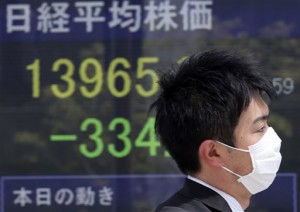Asian shares mixed after fresh Wall St. losses

A man walks by an electronic stock board of a securities firm in Tokyo Friday morning, April 11, 2014. Asia’s markets were mixed on Monday, April 14, following another heavy sell-off on Wall Street while concerns over the crisis in Ukraine resurfaced. AP PHOTO/KOJI SASAHARA
HONG KONG—Asia’s markets were mixed on Monday following another heavy sell-off on Wall Street while concerns over the crisis in Ukraine resurfaced.
Investors are also awaiting the release this week of first-quarter growth data from China, with analysts tipping a further slowdown in the world’s No. 2 economy.
Tokyo ended 0.36 percent lower, giving up 49.89 points to 13,910.16, while Sydney shed 1.28 percent, or 69.7 points, to 5,358.9, marking its heaviest fall in four weeks. Seoul was flat, dipping 0.42 points to 1,997.02.
Hong Kong closed 0.15 percent higher, adding 35.16 points to 23,038.80 while Shanghai ended flat, edging up 1.00 point, to 2,131.54.
US shares continued their downward spiral Friday led by the technology sector, owing to fears big-name firms such as Facebook, Twitter and Netflix may be overpriced.
Article continues after this advertisementThe Nasdaq sank 1.34 percent to its lowest close since February 3, the Dow tumbled 0.89 percent and the S&P 500 shed 0.95 percent.
Article continues after this advertisementAnalysts said there was also some nervousness as the corporate reporting season gets under way.
Adding downward pressure on markets is the crisis over Ukraine after clashes erupted between government forces and pro-Moscow militias.
Russia and the West traded barbs Sunday at the United Nations, with the Kremlin accusing the pro-Western interim government in Kiev of fomenting violence.
Britain, France and the United States blame Russia as fears grow that it is planning to send troops in to the east of Ukraine, in a move similar to that which saw it take over Crimea last month.
Eyes on China data
Closer to home for Asian investors, eyes this week are on Wednesday’s release of Chinese gross domestic product figures for January-March.
A survey of 13 economists by AFP saw a median forecast of 7.3 percent growth in the period, which would mark the fourth slowdown in the past five quarters, and put China on track for its worst annual performance since 1990.
Traders are increasingly worried about the Chinese economy, a key driver of global growth, following a string of weak data including on manufacturing and trade.
Some analysts say China’s leaders will soon unveil stimulus measures to get the economy back up to speed. However, others suggest Beijing is happy to endure some initial pain as it looks to transform the growth model from one driven by exports and government investment.
On currency markets the dollar was at 101.60 yen Monday afternoon compared with 101.65 yen in New York Friday afternoon.
The euro bought $1.3845 and 140.68 yen, down from $1.3882 and 141.11 yen.
Oil prices edged up. US benchmark West Texas Intermediate for May delivery gained 67 cents to $104.41 per barrel in afternoon trade while Brent North Sea crude for May rose 94 cents to $108.27.
Gold fetched $1,323.11 an ounce at 1010 GMT, from $1,320.08 late Friday.
In other markets:
— Jakarta rose 1.00 percent, or 43.31 points, to 4,864.88.
Miner Aneka Tambang gained 4.17 percent at 1,125 rupiah, while telecommunications company Indosat fell 1.04 percent to 3,810 rupiah.
— Kuala Lumpur ended flat at 1,851.53, falling just 1.13 points or 0.06 percent.
Telekom Malaysia lost 0.2 percent to 5.90 ringgit, while financial firm CIMB Group Holdings shed 0.3 percent to 7.38.
— Singapore gained 0.52 percent, or 16.61 points, to 3,214.83.
DBS bank rose 0.61 percent to Sg$16.63 while oil rig maker Keppel Corp. also climbed 0.36 percent to Sg$11.17.
— Taipei fell 0.57 percent, or 50.63 points, to 8,857.42.
Taiwan Semiconductor Manufacturing Co. rose 0.42 percent to Tw$120.5 while Cathay Financial Holdings shed 1.00 percent to Tw$44.55.
— Wellington fell 0.55 percent, or 27.89 points, to 5,063.54.
Fletcher Building was down 1.13 percent at NZ$9.59 and Air New Zealand fell 0.49 percent to NZ$2.05.
— Manila slipped 0.11 percent, or 7.41 points, to 6,589.55.
Metropolitan Bank and Trust shed 0.25 percent to end at 79.60 pesos and Philippine Long Distance Telephone was unchanged at 2,744 pesos.
— Bangkok and Mumbai were closed for public holidays.—Danny McCord